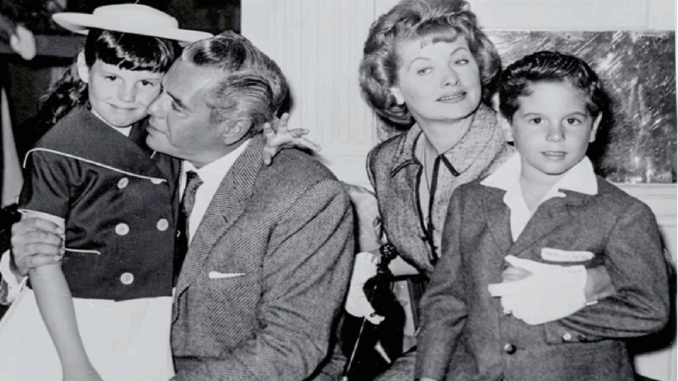
In his new book ‘Desi Arnaz: The Man Who Invented Television,’ biographer Todd S. Purdum delves deep into the life of the man most know as Ricky Ricardo
Desi Arnaz Jr. is opening up about his father, Desi Arnaz, and offering a rare look at a man who lived to entertain — but wrestled with his demons behind the scenes.
In his new book Desi Arnaz: The Man Who Invented Television, biographer Todd S. Purdum delves deep into the life of the man most know as Ricky Ricardo — or, perhaps, as Mr. Lucille Ball.
In interviews with the couple’s children — Desi Jr. and daughter Lucie — Purdum offers glimpses into the behind-the-scenes life of Arnaz and the tumultuous relationship of the I Love Lucy stars, who divorced in 1960, after 20 years of marriage.
The book offers a rare look at Desi Jr., who was — at the time of his birth in January 1953 — arguably the most famous baby in America. Desi Jr.’s birth was even incorporated into the show, and while he had his own foray into showbiz early on, he later retreated from the public eye and now rarely speaks to the press.
While audiences were delighted by his parents’ relationship, Desi Jr. told Purdum that behind the scenes, Lucy and Desi were incredibly argumentative
“It wasn’t good for anyone,” Desi Jr. told the author in the book. “And we’ll always remember when they sat us down and said, ‘Look, you know, things aren’t working.’ I mean, I remember word for word.”
:max_bytes(150000):strip_icc():focal(811x0:813x2):format(webp)/lucille-desi-children-3-060525-33761e40052d46f49cbf8025e2920dad.jpg)
In interviews with the author, the now-adult children explained how different their parents were. Lucie recalled how her mother “took it personally” when one of the children would disappoint her. Desi, by contrast, “was not like that,” she described.
“He would get really angry and blow his stack, and be loud, but then he’d be done and it would be like it never happened,” Lucie said. “Like a storm just passed. The storm never said, ‘I’m sorry,’ the storm never left a note saying, ‘I’m sorry, that wasn’t your fault.’ But it stopped, right? My mother would get personally offended by childhood behavior or what you said, because you should have known not to say that somehow, even though no one’s taught you what to say. And she would emotionally separate from you for however long she wanted to. And it would be sometimes days, sometimes weeks.”
:max_bytes(150000):strip_icc():focal(999x0:1001x2):format(webp)/lucille-desi-children-1-060525-fbe5a48a011e4675af1878f346fe2893.jpg)
When the children were involved in their parents’ work, by attending weekly shootings of I Love Lucy, they weren’t always happy.
Speaking to the author, Lucie detailed how she would “hide under the bleacher” when her mother introduced her to the audience.
Desi Jr., meanwhile, “was very much embracing the whole thing,” he said.
But theirs was not a normal life, instead hallmarked by the stardom of their parents and the strange upbringing that comes with being born to fame.
In one pivotal moment in the book, Johnny Aitchison, Desi’s secretary, described how strange it was to see a young Lucie and Desi playing with paper dolls of their own parents. “And it was the most natural thing in the world to watch these kids playing with that, just your normal kids having a good time, but playing with paper dolls of their parents.”
:max_bytes(150000):strip_icc():focal(824x303:826x305):format(webp)/lucille-desi-children-2-060525-f00541ab4f6c41878caf7737e1ac8883.jpg)
Of course, the highs of their star power were at times eclipsed by the lows, with the book detailing Desi’s descent into alcoholism.
It was his son, Desi Jr. — who himself had struggled with addiction and was thrust into the spotlight as a teen amid well-publicized romances with Patty Duke and Liza Minnelli — who helped him seek treatment.
Four years after Desi Jr. sought treatment (in 1981 at the Scripps Clinic near San Diego), his father came to him for advice. In 1985, Desi himself entered an alcohol rehabilitation program at the Scripps McDonald Center in La Jolla, where he registered under the name “Bill Sanchez” to protect his privacy.
“It was really nice,” Desi Jr. said, “because whatever I was going through, it was paying off. I said, ‘I can’t do anything for you, but there’s a place that can.’ He understood that.”
As Desi Jr. explained to the author, it was in fame where his father felt the most lonely: “That’s when he realized the emptiness—at the crest of his success. He didn’t stop drinking. He didn’t know what the real poison was. This is a temporary life.”
Desi Arnaz: The Man Who Invented Television (Simon & Schuster) is now available.
